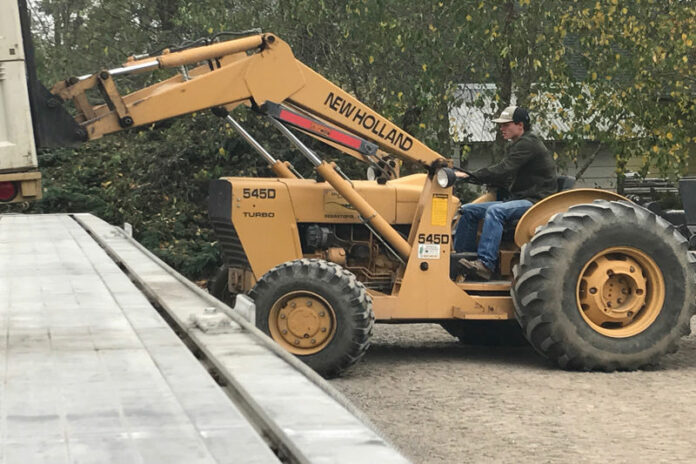
How Millennials will change and improve Sonoma County agriculture
Today’s farmers are not like last generation’s farmers. They’ve progressed as new technologies crop up, making farming easier and more efficient.
In the same vein, tomorrow’s farmers will not be like today’s farmers.
Faced with the perennial challenge of needing to do more with less, the next generation of Sonoma County farmers will be charged with adapting to — and ideally, behind ahead of — agricultural game changers and obstacles, including climate change, labor shortages and increasing regulations.
“There’s a general stereotype of farming as old fashioned,” said Emma Manoukian. “That’s simply not true. It’s one of the most innovative sectors. We’re constantly doing more with less. Less soil, less water and fewer laborers.”
Manoukian has been involved in agriculture since she was young.
As the youngest in a trio of siblings involved in Future Farmers of America, Manoukian was well versed and experienced in raising prize-winning sheep and pigs.
But more than showing animals, her FFA experience introduced her to many areas of agriculture, including politics and science.
Today Manoukian is a freshman at Cal Poly — San Luis Obispo, where she is majoring in agribusiness with a minor emphasis in agricultural communication.
She’s part of a cadre of 20-somethings born into multi-generational farming families from around the county who not only accept, but dive head first into their role to drive today’s farming standards toward a more sustainable and environmentally conscious position.
“Climate change is a big factor in agriculture, especially in California,” Manoukian said. “Water issues will never go out of style and biotech is going to play a big role in the future.”
Manoukian believes drought-resistant crops are going to be key for the county and state’s ability to provide food for the rest of the nation.
“So much of the nation relies on California for so many crops,” she said. “We can’t afford to have short, unbountiful years.”
California’s agriculture sector is a $45.3 billion industry, according to the California Department of Food and Agriculture. Sonoma County alone accounts for almost $900,000 of that total receipt.
According to the county’s 2016 crop report, alongside a 17 percent increase in production over the previous year, the county’s farmers are making gains in its dedicated sustainability efforts under programs like the vineyard and orchard development permits (VESCO) program.
The voter’s latest and successful effort to ban genetically modified crops in unincorporated Sonoma County could put a halt to any type of drought-resistant crop.
It’s a type of policy that Manoukian believes was made and approved without farmers in the room.
“So many decisions get made without considering the farmer,” she said.
At Cal Poly San Luis Obispo, Manoukian studies with environmental science majors, enabling two sometimes opposing forces — those who work the land for their livelihoods and those who believe the land should be left alone — to gain better understanding of how environmental preservation and agriculture can find common ground and work together to fight mounting issues, including climate change.
“It’s a big misunderstanding that farmers don’t care about the land,” Manoukian said. “There’s a huge gap between environmentalists and agriculture. I see a lot of environmentalists in political and advocacy roles, which is great. But agriculture needs representation too.”
That’s where Manoukian comes in; she hopes to use her education and passion for politics to be a voice for the underrepresented farmer.
“Decisions can’t be made by people who have no understanding about what goes on at the farm,” she said.
Such decisions, Manoukian said, can be detrimental to the farmer. “Changes take time. They can’t be made overnight,” she said.
Jake Dutton agrees. Jake is the third generation of Duttons to farm Sonoma County land. The Dutton empire includes a ranch, vineyards and apple orchards spread throughout west county.
“A lot of these decisions can suck for the small farmer and the small business,” Dutton said. “But at this point in time, we can’t be selfish.”
Dutton has been involved in the ranch’s work since he was 14 and continues today at age 20 in between studying at Santa Rosa Junior College.
While he acknowledges that the ranch’s operations are working well, he admits that changes to become more sustainable are on the horizon.
“As the ranch progresses we are having to do more with less,” he said. “That’s the big thing in the farming industry. We have to grow more product with less ground.”
Dutton said the ranch, which is owned and operated by his father and uncle, is constantly trying to be more efficient.
He acknowledges, just as Manoukian does, that additional efforts will be needed — and demanded by legislation — in the future. As such, the ranch has to plan many seasons ahead to ensure sustainability efforts don’t bankrupt the farm.
For example, by 2025 all large semi trucks used by farms must be equipped with a diesel exhaust flow system.
“None of our trucks have that now,” he said, adding that the system can’t just be placed into an existing truck. “It’s going to be a multi-million dollar investment.”
Despite the daunting costs, Dutton is excited about what the future brings. “I definitely see electric vehicles making their way onto the farm more,” he said. “It’s going to help limit a farm’s carbon footprint, which right now, can be really big.”
Dutton said bringing electric vehicles into the ranch will be an important effort to help the county’s agricultural leaders fight climate change. “Without the environment or the land, we don’t have a job. We don’t have food,” Dutton said. “We’ll have to do whatever it takes to stay sustainable.”
CAPTIONS: Photo courtesy Jake Dutton
Loader — Jake Dutton is working his way through learning the many roles of the ranch in effort to understand its intricate parts and how they can become more sustainable and efficient.







